*This is the first part of a series of articles on Sustainability
Toys going into the dump
The toy industry is a major contributor to earth’s growing waste problem.
In 2021, the global toy industry was estimated to be worth US$156.5 billion, a figure that is set to rise to US$249.6 billion by 2027. Around the world, the number of toys that are being produced and consumed is steadily growing, but unfortunately, the bulk of these toys (usually made from plastic) eventually end up in landfills, incinerators and the ocean. According to Dagoma, every year around 40 million toys end up as trash in France alone.
Throwing toys away pollutes our planet and is detrimental to its health. For example, burning plastic toys (and any accompanying packaging) can release toxic chemicals into the environment, and improperly discarded toys can damage natural ecosystems and ruin their beauty. Many toys are not recycled because they are made up of a combination of complex materials, making it economically inconvenient to sort them into the correct waste stream for processing.
Most toys (both electronic and non-electronic ones) only have a limited life span. Interest in toys usually fades after a period of time, and children rapidly outgrow them during their formative years (remember the plot of Toy Story 2?). Once toys have served their purpose, they are often kept in storage for a while before being disposed of once space runs out. This is unsustainable, and a drain on earth’s finite resources.
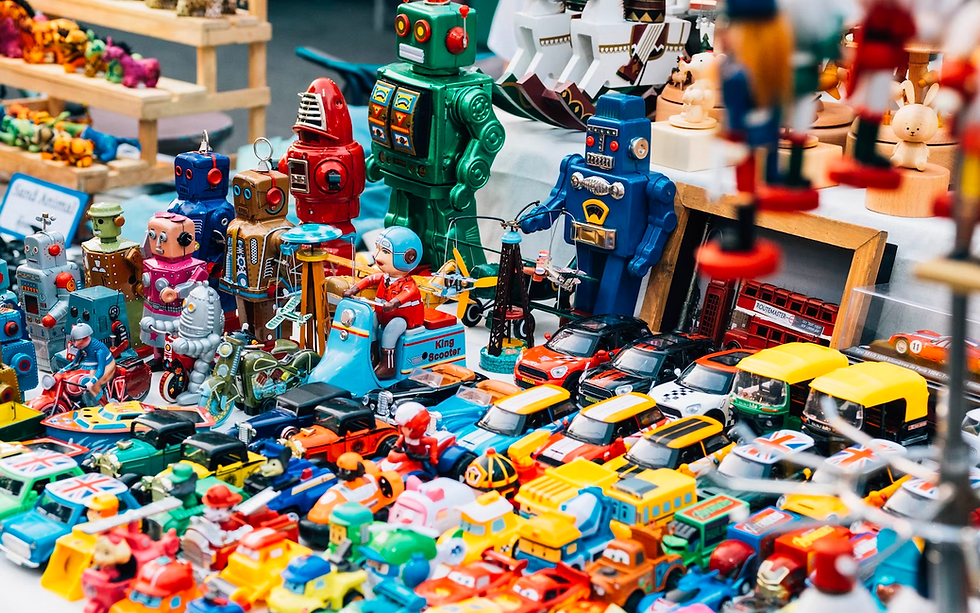
Photo taken from unsplash
Towards a sustainable toy industry
As the green agenda gains traction, toymakers are starting to play their part to address this growing waste problem by designing sustainability into their toys and business models, to cut down on pollution and conserve limited resources. For instance, LEGO has introduced the Replay initiative, encouraging owners to donate their used toy bricks to children’s charities, and has also set itself the goal of making all its bricks from renewable or recyclable materials by 2030.
As a social enterprise that deals with toys (mechanical puzzles and science curios), Project Enigma strives to be sustainable in our operations too, and achieve our triple bottom line of people, planet and profit. How do we do this?
Our solution: A circular/sharing model of distribution
We employ a circular/sharing model to introduce a wide range of toys to a large pool of users through 1) retaining product ownership while offering alternative means of access and 2) extending product life through extensive reuse and repair. This overturns the conventional business model of buying and selling toys which has led to so much wastage.
Here are 4 services we offer which illustrate this.
1. SparkBox puzzles and games
Project Enigma’s flagship offering is SparkBox, a rental subscription service for mechanical puzzles. Instead of selling toys, we lend out a common pool of mechanical puzzles to our customers, reusing them and sanitising them between exchanges. Throughout the product’s life cycle, it would have seen a dozen homes or offices, maximising its use as opposed to if it were held by a single person.
In addition, we do away with packaging by placing the puzzles in a no-frills box, reducing waste and saving on costs. A customer gets access to these products at a third of their retail cost or less since they are on loan. In fact, so long as the puzzles retain their functionality after a certain number of loans, it may bring us a higher return on investment as opposed to a one-off sale.
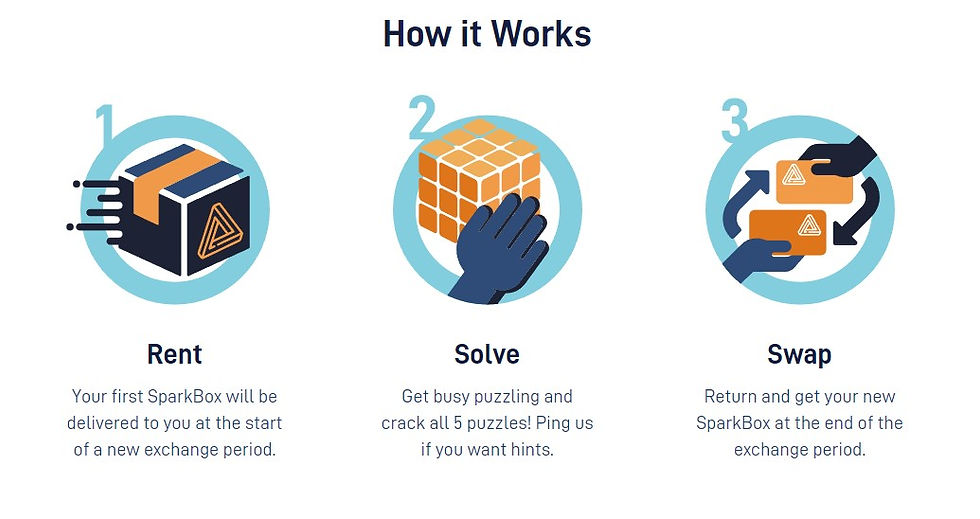
The SparkBox sharing model
It also helps that these mechanical puzzles tend to be well-crafted and made of durable materials (metal or wood) that can stand the test of time. Having these toys circulate between many people also makes sense, considering that mechanical puzzles tend to have little re-playability. Once a hidden mechanism (or trick) of the puzzle has been found, the puzzle is “solved” and can be passed along to the next player.
2. AhaCorner
We also have AhaCorner, a temporary pop-up puzzle booth that can be set up at a time and place of the customer’s choice, for other users to come and play with our vast collection of puzzles and toys for no cost. Through our past pop-up booths, hundreds of people were able to play with our puzzles in a span of a few hours. Project Enigma’s team was on the ground as well, and helped to facilitate puzzle-solving and ensure that everyone handled the puzzles with care.
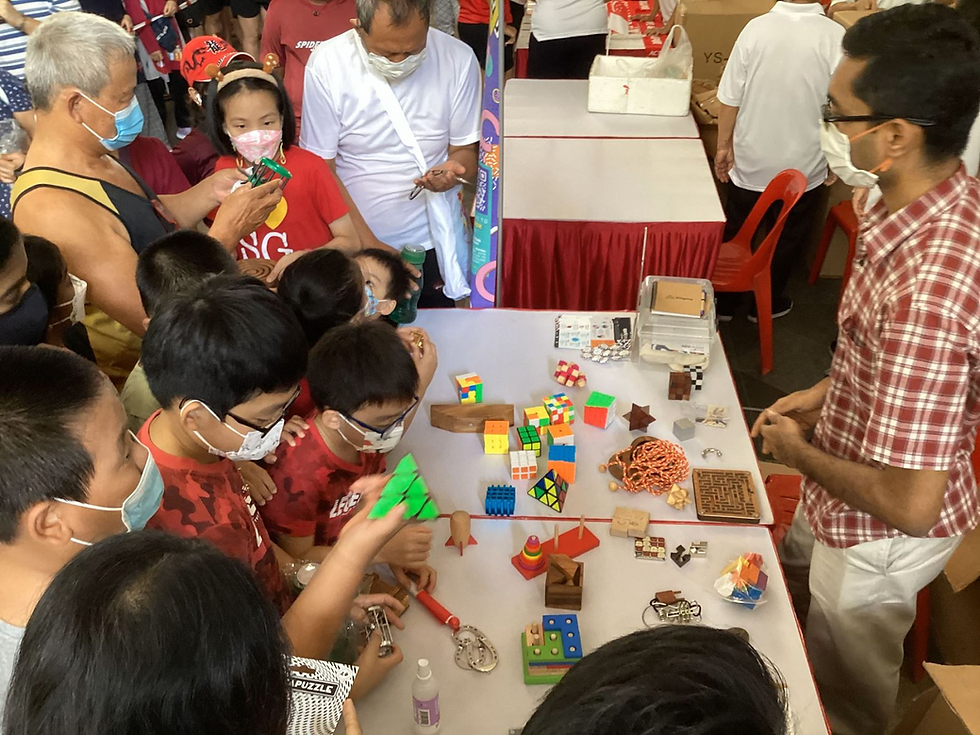
AhaCorner event held at Kampung Admiralty on National Day (2022)
3. Puzzletopia
Next, Puzzletopia is our interactive museum cum library, located only a short walk away from Farrer Park MRT. When our puzzles are not out on loan or being used for any other offerings, they will be returned here by default. Using this to our advantage, we grant interested visitors access to this library after paying a small fee - visitors can pick up and play with anything they fancy in our collection for as long as they want. This is a simple and easy way to share the joy of puzzles and toys in our community without selling them, and so far, we have hosted over 80 group/individual visits to our puzzle library.
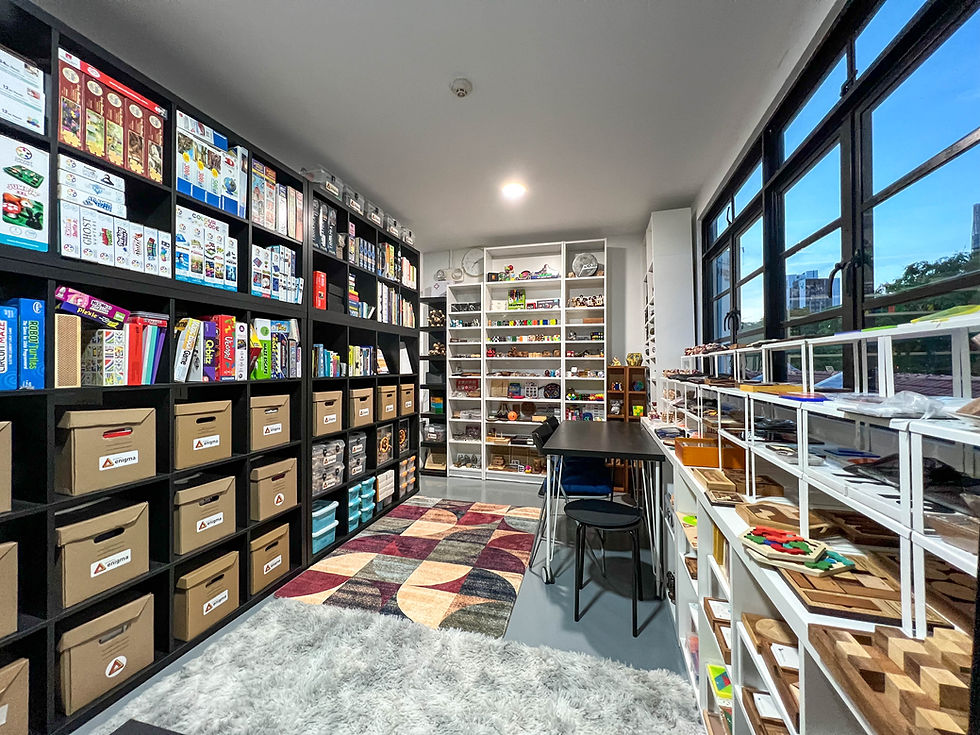

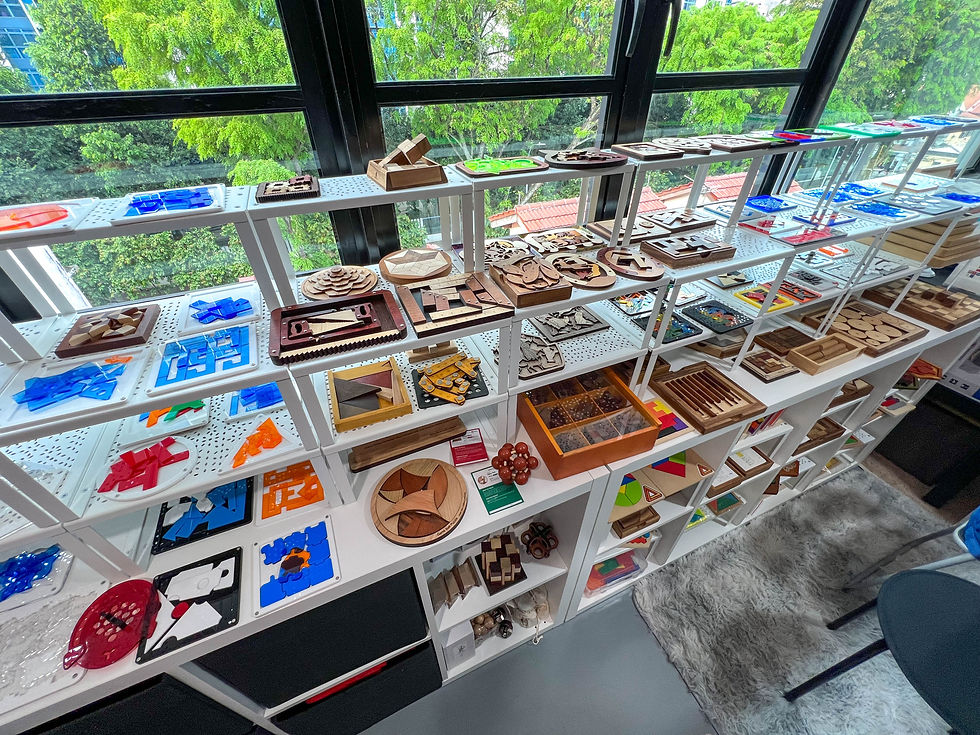
Our vast collection of puzzles and toys that visitors can pick up and play with
4. PuzzleHour
Finally, we also run on-site hands-on workshops and classes for Adults, Youths and Kids in PuzzleHour. Our volunteers bring down a variety of mechanical puzzles for participants to play with, and guide them through solving them. These puzzle classes have proven a hit with both youths and adults. We have also conducted classes for seniors at the Anglican Care Centre as part of their cognitive therapy sessions, to assist in their recovery.

One of our volunteers running a PuzzleHour session with a family
Spreading the benefits of mechanical puzzles and science toys the GREEN way
It is unfortunate that much of the toy industry remains traditional - toys are bought, kept and discarded once their owners no longer find them entertaining. Even as we acknowledge this, we also recognise that toys are still valuable tools that can be used for educating and training children and youths especially in the area of STEAM (Science, Technology, Engineering, Arts, Mathematics).
Thus, our social enterprise strives to continue spreading the benefits of mechanical puzzles and science toys, but not at the expense of the environment. By adopting a circular/sharing model as seen in our different services (SparkBox, AhaCorner, Puzzletopia and PuzzleHour) we get the best of both worlds. While we may sell some of our mechanical puzzles/science toys in the future, we will do so only after ensuring that our products are sustainably sourced and manufactured, and will likely be offering users a buy-back option if they no longer wish to keep them.
Moving ahead with the times
Rethinking toy distribution is just one way we practise sustainability in our business. There are other ways to go green, and staff at Project Enigma actively attend sustainability-related programmes (e.g., UOB FInLab’s Sustainability Innovation Programme 2023) to keep ourselves informed of the latest environmentally-friendly practices of businesses. Through these workshops, we learn and continue to update our business model to be in line with the most recent trends in sustainability.
Project Enigma will continue to play our part in creating a greener world. This is our promise. We hope that through our work, we reuse, reduce and recycle, and change communities one puzzle at a time.
In addition, we are also committed to reducing packaging waste, which we have written about in our blog post here.
This article was adapted from a Youth Action Challenge (YAC) pitch that Project Enigma delivered in January 2023. The YAC is organised by the National Youth Council and Youth Co-Lab to encourage youths to turn their ideas into reality through mentorship programs, workshops and partnerships with the government, businesses and community organisations.
Project Enigma successfully clinched the Promising Award at YAC to build and scale our science toy division sustainably, and emerged as one of 2 Youth Co-Lab champions, earning the opportunity to work alongside UNDP and Citi Foundation in the next phase of our growth.
Follow us on social media:
>> Instagram: https://www.instagram.com/projectenigma.sg/
>> Facebook: https://www.facebook.com/projectenigma.org/
REFERENCES
Matthew Watkins. “How to find the most sustainable and long-lasting children’s toys.” The Conversation. https://theconversation.com/how-to-find-the-most-sustainable-and-long-lasting-childrens-toys-125968
Lindsay Brown. “Plastic Toys: Is it time we cut back?” BBC News. https://www.bbc.com/news/science-environment-47868871


Reddy Anna Book offers great odds, a user-friendly interface, and excellent customer support. Whether you’re a seasoned bettor or a beginner, Reddy Anna makes it easy to place bets on a variety of sports. I highly recommend checking out for Reddy Anna Book anyone looking for a reliable and trusted betting site.The platform offers a great variety of betting options, and the odds are always competitive. it is so easy to navigate for making betting experience smooth and enjoyable. Reddy Anna is definitely a name you can count on for a seamless betting experience!
To know more visit - https://thereddyannabook.in
My aunt used to feel isolated until her senior center started a card https://thehomeaides.com/ game night. Now she’s the queen of bridge, laughing with new pals. Social engagement in senior care fights that quiet sadness—it’s about building a community where they thrive.
Get ready for the excitement of the Champions Trophy 2025 with Reddy Anna Book! Stay ahead of the game with real-time updates, expert insights, and thrilling betting opportunities. Whether you're a seasoned bettor or a cricket enthusiast, Reddy Anna Book ensures a seamless and engaging experience throughout the tournament. Don't miss out on the action—join now and make the most of Champions Trophy 2025! 🚀🏏
For more details - https://thereddyannabook.in/
Cricbet99 is the ultimate platform for cricket enthusiasts gearing up for the Champions Trophy 2025. Stay ahead of the game with real-time insights and expert analysis on Cricbet99. Don't miss out on the action—explore exclusive features with a seamless Cricbet99 login. Get ready to experience the thrill like never before.
For more details visit on- https://cricbets99.ind.in/
When injured in an accident, having a knowledgeable Miami https://galimidilaw.com/ accident lawyer makes all the difference. They understand personal injury laws, gather evidence, and handle negotiations to secure maximum compensation. Without legal guidance, victims may struggle with insurance companies trying to minimize payouts. A reliable lawyer ensures fair treatment and justice.